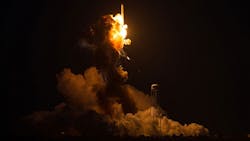New Rocket Engine Needed, Boeing Says after Antares Crash
As the investigation of Wednesday's crash of the unmanned Antares rocket continues, Orbital Sciences Corp., which owns the rocket, said Thursday that the rocket's flight termination system was engaged prior to the rocket hitting the ground.
The action was taken once it became clear there was a problem after the launch, an Orbital Sciences spokesman told CNN.
"Evidence suggests the failure initiated in the first stage after which the vehicle lost its propulsive capability and fell back to the ground impacting near, but not on, the launch pad," Orbital Sciences Corp. reported on its website.
Meanwhile, a Boeing official said the failure illustrates the need to develop a new rocket engine.
"We need to move beyond today’s technology ... and look for that next generation of engine that’s even more reliable, even more capable," Chris Chadwick, chief executive of Boeing Defense, Space and Security, told Reuters in an interview.
The news agency reported that the rocket was powered by "a pair of Soviet-era NK-33 engines that were rebuilt by Aerojet Rocketdyne, a unit of GenCorp, and resold as AJ-26 engines. Even before the crash, Orbital had planned to switch to another engine given the age of the motors and uncertainty about future supplies."
The Antares rocket crashed in a huge fireball Oct. 28. "After the countdown, the base of the tall, white rocket ignited on cue, then rose a short distance into the air before it suddenly exploded in a fiery blast six seconds later," Agence France-Presse reported.
The Cygnus cargo spacecraft, which is launched by the Antares rocket, carried 5,000 pounds of supplies for the six astronauts living at the International Space Station, AFP said.
About the Author
Jill Jusko
Bio: Jill Jusko is executive editor for IndustryWeek. She has been writing about manufacturing operations leadership for more than 20 years. Her coverage spotlights companies that are in pursuit of world-class results in quality, productivity, cost and other benchmarks by implementing the latest continuous improvement and lean/Six-Sigma strategies. Jill also coordinates IndustryWeek’s Best Plants Awards Program, which annually salutes the leading manufacturing facilities in North America.
Have a story idea? Send it to [email protected].

